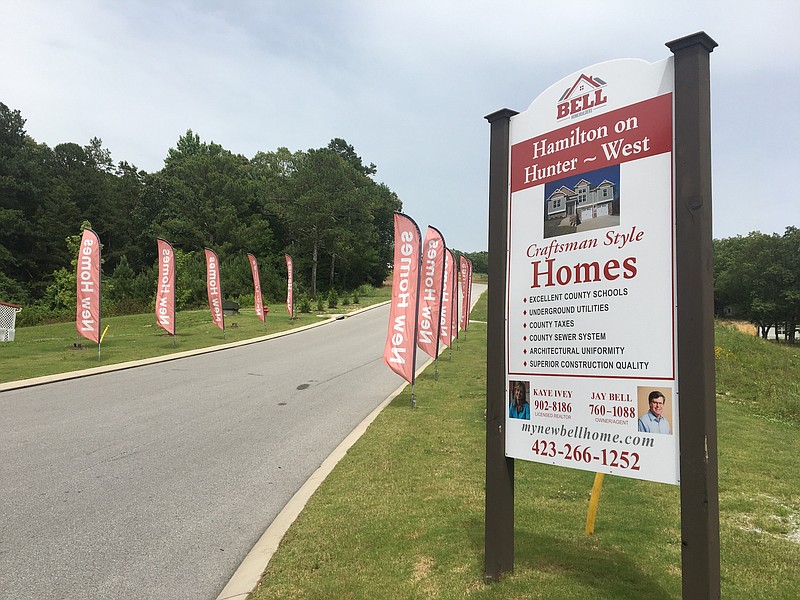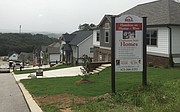When the novel coronavirus began to spread in Chattanooga this spring, home sales by Chattanooga Realtors dropped by more than 20% in April and May as both sellers and buyers stayed home and were initially cautious to make any moves during the pandemic shutdowns.
But as the economy has reopened - and an accommodating Federal Reserve Board has helped push mortgage rates to an all-time low - the housing market is rebounding. Although local home sales this year are unlikely to match the record highs reached in 2019, Realtors insist the local market remains vibrant, with home prices still increasing and those homes that are on the market selling at an even quicker pace.
"The inventory of homes being sold is down, but that doesn't mean the market is down," says Brandi Pearl Thompson, an agent for Keller Williams Realty who is the 2020 president of the Greater Chattanooga Realtors association. "There was a lot of uncertainty over the coronavirus initially, so a lot of people just held back for a while in putting their homes on the market. But I definitely think the market is going to be stronger this fall."
Thompson says some homeowners have been reluctant to show their houses during the pandemic, and the construction of new homes hasn't kept pace with demand for most of the past decade coming out of the Great Recession in 2008-2009.
Home builders have continued construction work amid the coronavirus outbreak, but the number of home starts is barely more than half the record high levels reached in the Chattanooga region in 2005, according to building permit data assembled by the Market Edge in Knoxville.
Getting some building supplies has been tougher and practicing social distancing on the work site has slowed building schedules this year, in some instances.
"But borrowing rates are at all-time lows and home building is a long-term value purchase that will outlast the pandemic," says Dale Akins, owner of the Market Edge newsletter that tracks real estate activity across the Southeast.
Akins says home sales and starts have held up during the economic slowdown sparked by the coronavirus pandemic.
"It's sort of surprising that building permits have not slowed up," he says. "I know many industries have been hammered hard by this pandemic. But construction and real estate are not one of them."
As an outdoor activity with building jobs usually somewhat scattered, home building continued this spring while many industries temporarily shut down.
"We saw somewhat of a slowdown (in the first half of 2020), but most home builders I talk with right now are slammed with business," Akins says.
Lawrence Yun, chief economist at the National Association of Realtors, predicts home sales "could even surpass one-year-ago figures in the second half of the year."
Win Pratt, president of Pratt Homes, says housing demand remains strong with inventories near all-time lows.
"We're continuing to build and constantly looking for new opportunities for development, but land prices continue to rise and there seems to be endless bounds of governmental regulations that make it quite cumbersome to permit new projects," says Pratt, whose company is the biggest single home builder in Chattanooga.
"The virus has also caused us to have fewer workers on some of our work sites and created some building supply challenges that have slowed some projects. But the market remains relatively strong and we're trying to meet the demand. We may not be able to deliver as many homes as we did last year due to the virus, but people are still buying houses so we're still building them."
Some short-term shortages of concrete, treated lumber and other building supplies are limiting some home construction or even remodeling projects needed to put homes on the market, Thompson says.
Single-family home sales
Realtor-assisted sales of single-family homes rose to a record high last year, nearly double the depressed level reached a decade earlier during the Great Recession of 2009-2010* 2019 - 10,714 homes with median price of $203,085* 2018 - 10,034 homes with median price of $187,00* 2017 - 9,826 homes with median price of $175,000* 2016 - 9,672 homes with median price of $161,000* 2015 - 8,764 homes with median price of $152,000* 2014 - 7,827 homes with median price of $142,000* 2013 - 7,634 homes with median price of $134,900* 2012 - 7,038 homes with median price of $131,500* 2011 - 5,996 homes with median price of $124,000* 2010 - 5,803 homes with median price of $128,000* 2009 - 5,595 homes with median price of $130,775* 2008 - 5,989 homes with median price of $139,000* 2007 - 7,024 homes with median price of $139,000* 2006 - 7,870 homes with median price of $137,000Source: Multiple Listing Service sales by Greater Chattanooga Realtors
Home buying demand grows
Despite the economic slowdown due to the pandemic, home buying in Chattanooga is being buoyed by historically low interest rates, the growing number of Millennials entering the home-buying market and Chattanooga's growth and attraction to outside investors lured by home prices still priced nearly 30% below the U.S. average. The April tornados also displaced hundreds of homeowners, at least temporarily, and many of them are looking for, or have settled into, new homes.
After spending months in relative lockdown, many residents are also eager to find better housing.
"Either people don't like who they are living with or they don't like the home they're in, so the pandemic has encouraged more people to start looking for other housing," says Sabrina Hagood, a Realtor with Keller Williams and chair of the Diversity Inclusion Committee for the Greater Chattanooga Realtors.
The biggest problem for most Realtors is getting enough inventory of houses on the market to meet demand.
"Like a lot of Realtors, we've been slammed lately and there are not a lot of homes available to meet the demand," Hagood says.
Austin Sizemore, who has built his own real estate team in just three years, says multiple offers for homes are now quite common and some homes are actually selling above list price.
"It's still a sellers' market," he says.
The inventory of homes for sale in Chattanooga has fallen to one of the lowest levels in history. The inventory of homes for sale on the Chattanooga Realtors' multiple listing service in May 2020 totaled just 2,006, which was down 31.9% from a year ago. The number of homes for sale this spring was less than the 2,307 licensed Realtors in Chattanooga.
But home builders aren't necessarily rushing to fill the void, at least with single-family homes. Even with higher average home prices and quicker average selling times, home builders started 7% fewer new houses in the Chattanooga region during the first quarter of this year compared with the previous year. Last year, home builders started building 6% fewer homes than in 2018 and home starts last year were down nearly 43% from the peak number of new homes started in the Chattanooga area in 2005, according to Market Edge.
Home starts in Chattanooga
The number of single-family building permits issued in the first quarter of 2020 was down nearly 7% from a year ago. For all 2019, home starts in Chattanooga were down 6% from the previous year and were nearly 43% below the peak in housing construction reached in the Chattanooga area in 2005.* 2005: 4,484* 2006: 3,984* 2007: 2,927* 2008: 1,712* 2009: 1,358* 2010: 1,225* 2011: 1,142* 2012: 1,461* 2013: 1,461* 2014: 1,486* 2015: 1,785* 2016: 2,247* 2017: 2,271* 2018: 2,719* 2019: 2,566*First quarter 2020: 589, down from 632 the previous yearSource: MarketEdge. Chattanooga data from Hamilton and Bradley counties in Tennessee and Whitfield, Catoosa and Walker counties in Georgia.
Home prices increase
That has bid up the price of houses in Chattanooga. The median home price in Chattanooga rose by 8.7% in the past year, or more than double the average wage gain of 4% last year. Over the past decade, the median price of Realtor-assisted home sales has jumped by 55.3%, while wage rates grew less than 40% in the same period.
Such home price appreciation offers home buyers and investors attractive returns on their home purchases. But it also has made home affordability more of a challenge to many residents, especially those in lower-paying occupations.
"New home construction needs to robustly ramp up in order to meet rising housing demand," Yun says. "Otherwise, home prices will rise too fast and hinder first-time buyers, even at a time of record-low mortgage rates."
Rising land, labor and supply prices have combined to raise the cost of new homes at a faster pace than the growth in income. As a result, home affordability as measured by the share of average households that can afford to buy a typical home in the market has declined over the past five years, according to the index of affordability tracked by the National Association of Realtors.
Traditionally, Chattanooga has not had a shortage of property and few houses demolished to make way for bigger replacement homes. But that is changing with more infill and more desire to build more modern homes within the urban core.
"We've seen more tear-downs in the past five years than we probably have probably seen in the history of Chattanooga," Thompson says. "High density is not the devil and it's necessary to help get more supply and keep home prices in check."
READ MORE
* Going big ... Despite coronavirus, most large projects move ahead in Chattanooga
* Agents of change: Real estate pros never stop rethinking how the deals get done

